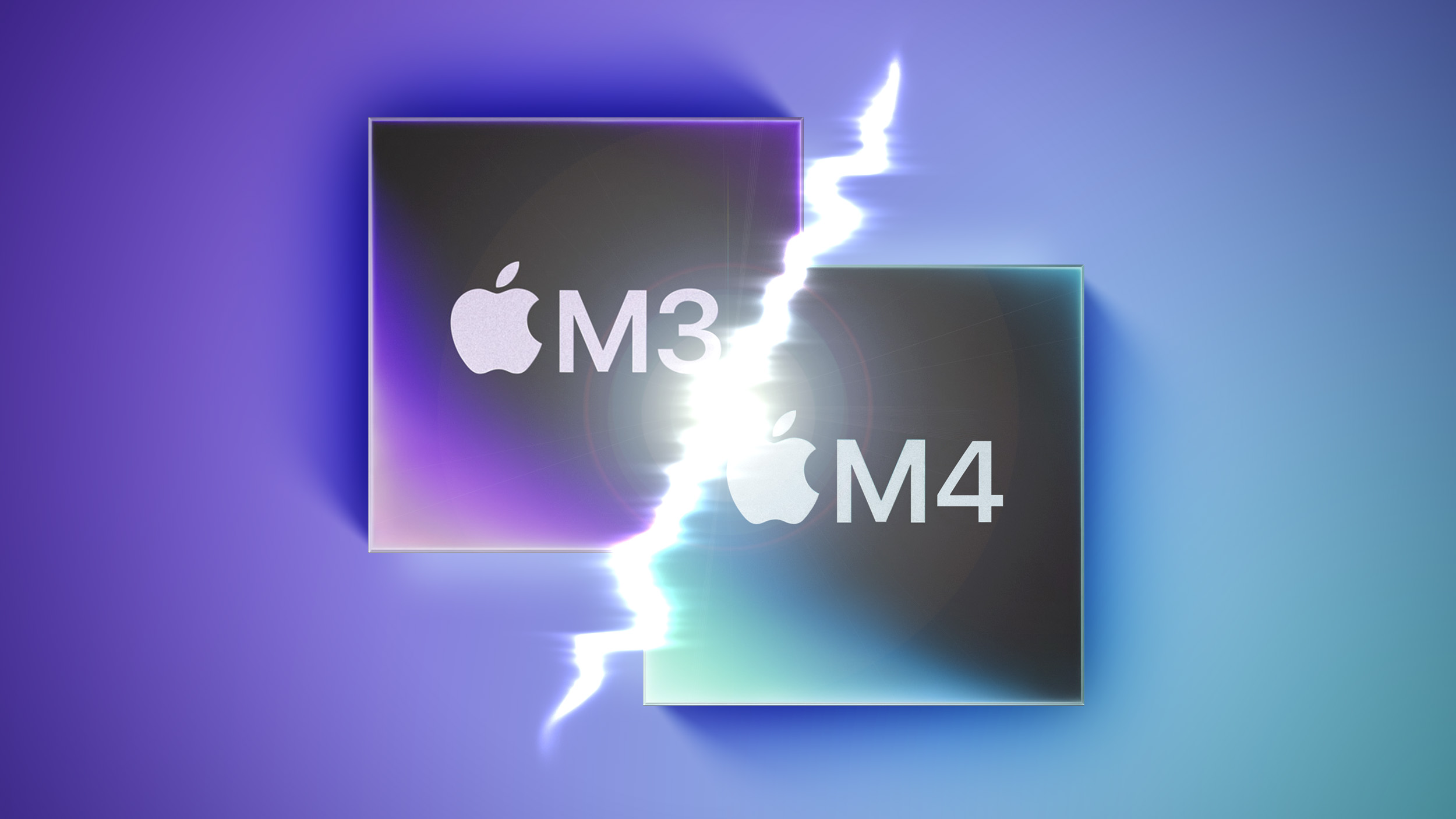![]()
Apple today announced the first of its M4 Mac models, but how much better really is the M4 chip over its predecessor?
The M4 chip debuted in the iPad Pro earlier this year, promising around 20% faster performance than the M3 chip in both single and multi-core tasks. All of the key differences between the two chip generations are listed below:
| M3 Chip (2023–2024) | M4 Chip (2024) |
|---|
| Made using TSMC's 3nm technology (N3) | Made using TSMC's enhanced 3nm technology (N3E) |
| Based on iPhone 15 Pro's A17 Pro chip (2023) | Based on iPhone 16's A18 chip (2024) |
| 25 billion transistors | 28 billion transistors (+12%) |
8-core CPU
(4 performance + 4 efficiency cores) | Up to 10 CPU cores
(4 performance + 6 efficiency cores) |
| 4.05 GHz CPU clock speed | 4.3 GHz CPU clock speed |
| 16-core Neural Engine, 18 trillion operations per second | 16-core Neural Engine, 38 trillion operations per second (+111%) |
| LPDDR5 memory | LPDDR5X memory |
| 100 GB/s memory bandwidth | 120 GB/s memory bandwidth (+20%) |
| Dedicated display engine |
| GPU with standard power efficiency | More power-efficient GPU: Maintains performance with significantly less power |
Most of these upgrades, with the exception of core counts and memory bandwidth, apply to the entire selection M3 and M4 chips. Using Geekbench benchmarks, these are the approximate performance gains you can expect from the M4 chip:
| Benchmark Type | M3 Chip Performance | M4 Chip Performance (Improvement) |
|---|
| Single-core CPU | 3,088 | 3,864 (+25.1%) |
|---|
| Multi-core CPU | 11,711 | 15,288 (+30.5%) |
|---|
| Metal GPU | 47,466 | 57,603 (+21.4%) |
|---|
While the M4 chip features notable enhancements over the M3, such as increased CPU and GPU performance and improved efficiency, the practical differences for users upgrading from an M3 system may not be as radical as the specifications suggest. The M3 chip already delivers impressive performance and efficiency, making it a formidable contender in its own right.
The 25.1% improvement in single-core performance and 30.5% in multi-core performance highlight technical advancements, but for many users, especially those already equipped with M3-based devices, the everyday experience will likely not feel dramatically different. Tasks that benefit from single-core speeds, like launching apps and light productivity work, will be snappier, but for those accustomed to the M3's capabilities, this difference may not significantly impact their workflow.
Similarly, the 21.4% increase in GPU performance means better graphics rendering and gaming capabilities, yet users who have enjoyed the M3's performance may find these enhancements less noticeable in routine tasks. The improvements in gaming and creative applications will benefit users who are heavily engaged in graphics-intensive work, but those using the M3 might not feel compelled to upgrade solely for these reasons.
The 111% boost in the Neural Engine is a standout figure, emphasizing the chip's impressive artificial intelligence and advanced machine learning capabilities. However, for many users, especially with less demanding requirements, the difference might not justify the upgrade, especially as both the M3 and M4 chip support Apple Intelligence. That being said, the M4 chip's significantly improved Neural Engine makes it more likely to support and effectively run new Apple Intelligence and AI features as they emerge over the years.
In terms of memory bandwidth, the 20% increase allows for faster data transfer, which is beneficial for data-heavy applications. Yet, again, for users already using the M3, this improvement may not translate into a dramatic change in performance.
Ultimately, while the M4 chip certainly pushes the boundaries of what is possible in Apple's silicon, it may not represent a radical shift for those already using the M3. Instead, the M4 is likely aimed at users looking to upgrade from M1 chips or older Intel systems, where the jump in performance is far more pronounced.
For existing M3 users, the decision to upgrade may hinge more on specific needs and applications rather than a broad expectation of enhanced performance. For example, M3 Max chip users who push their system to the limit with highly intensive tasks may have good reason to upgrade. Likewise, if your current M3 or M3 Pro system seems to be insufficient for your workflow, you could consider upgrading to an "M4 Pro" or "M4 Max" device when they're available, but these upgrade paths will be unusual.
Article Link:
M3 vs. M4 Chip Buyer's Guide: How Much Better Really Is M4?




